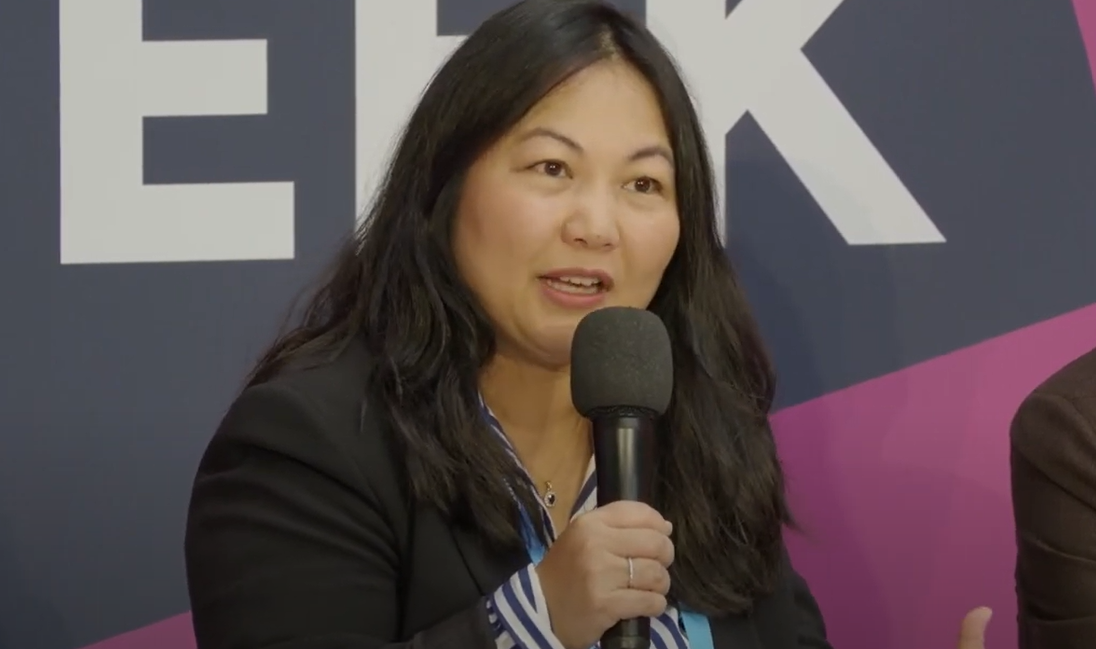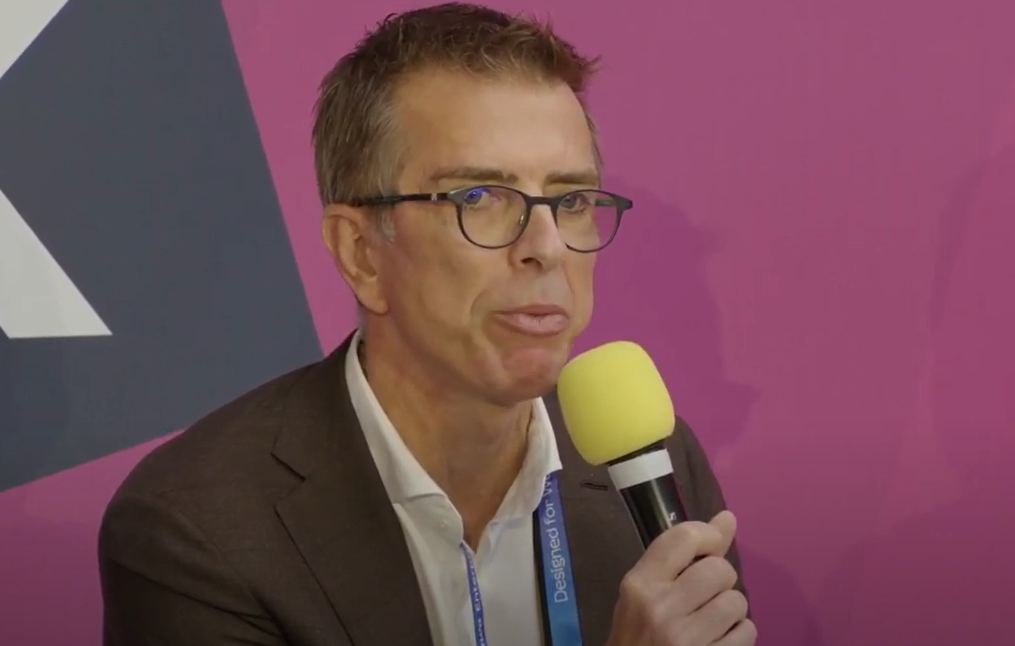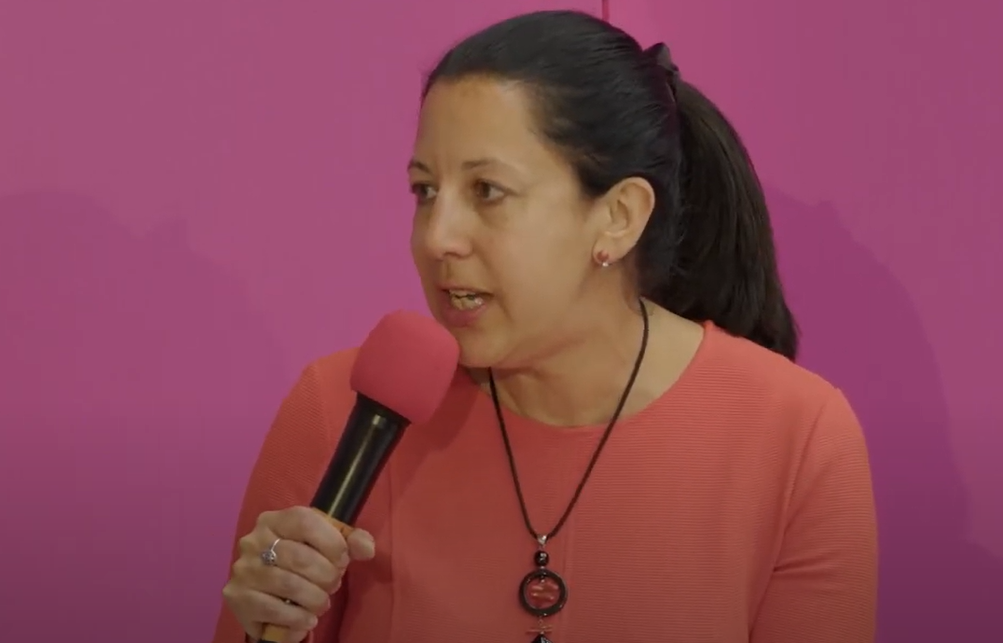Watch our panel on how to unlock pre-scaling success for UK tech startups. Hear from entrepreneurial leaders Phill Robinson (Founder at Boardwave), Priya Guha MBE (Venture Partner at Merian Ventures & UKRI) and Scott O’Brien (CIO at Innovate UK) in this session, hosted by Ayuna Nechaeva (Head of Europe, Primary Markets at the London Stock Exchange).
This video article forms part of our 2024 London Tech Week highlights series and has been created using a transcript.
Speaker List
Phill Robinson (Founder at Boardwave)
Priya Guha MBE (Venture Partner at Merian Ventures & UKRI)
Scott O’Brien (CIO at Innovate UK) in this session
Host
Ayuna Nechaeva (Head of Europe, Primary Markets at the London Stock Exchange).

The London Stock Exchange’s Role in UK Startups
Ayuna: [00:00:00] Thank you very much. My name is Ayuna, and I am the Head of Europe Primary Markets at the London Stock Exchange. This very corporate title is actually quite simple to explain: I talk to founders and CEOs all around Europe and Central Asia, and we discuss IPOs, listings, and how to raise capital in London.
Private Markets and Funding Opportunities
We, at the London Stock Exchange, also have private markets. We have a platform called Flow.io and a system called Prices, which is a crossover system for secondary fundraising, and so on and so forth. I’m very close to some of the discussions we've had here today. It is my pleasure to host this panel today about the pre-scaling opportunity, focusing on the UK tech startup ecosystem and discussing how to scale your business. I'm delighted to chair this wonderful panel of fantastic experts.
Introducing Panel Experts: Voices in the UK Tech Scene
I would like to introduce Phil Robinson, the founder of BoardWave; Priya Guha, a venture partner at Merian Ventures; and Scott O'Brien, the director at Innovate UK. To kick off, I invite each of you to take 30 seconds to talk about your mission, why you're doing what you're doing, and what your main objective is.
Book your startup pass now to meet future unicorns, investors, and entrepreneurial leaders in the London tech scene.
BoardWave: Addressing the Challenge of Scaling Tech Startups
Phil: My name is Phil. I started a company called BoardWave two years ago because I saw a lack of success in Europe in building large-scale global leaders in software companies. So, we created an organisation that serves as a social enterprise for founders and CEOs to help them scale more effectively across the UK and Europe, challenging the dominance of American firms and aiming to be leaders in the next 10 years.
The Diverse Role of a Venture Partner in Today’s Ecosystem
Priya: My name is Priya Guha. I wear a number of hats across the tech and innovation ecosystem. I have roles in government, venture capital, and working directly with startups, as well as some PLC (Public Limited Company) roles. I wanted to build a view of the ecosystem because I see a real opportunity to connect the dots across both early-stage and late-stage ventures, as well as across the global tech landscape. It’s lovely to be here.
Support Systems for Innovation: Insights from Innovate UK
Scott: I’m Scott O'Brien, Chief Investment Officer at Innovate UK. We are the UK's innovation agency. Our mission is to support the entire innovation system, from concepts through R&D phases into commercialisation, growth, and scale. We do this through a mix of interventions, from business support to grants and financial instruments such as loans, along with wrap-around services that connect the ecosystem together.
Join us at London Tech Week 2025 to meet investors, make connections, and learn from leading tech founders and entrepreneurs.

Analysing the UK Startup Ecosystem: Current Landscape and Comparisons
Ayuna: So if you need capital, talk to Scott. All right, let's set the scene for our discussion today. Let's talk about the UK startup ecosystem. What is the current state of play, and how does it compare to the European or U.S. ecosystems?
Phil: Looking at the UK startup ecosystem, it is quite successful. There has been significant support over the last 10 years or so from the government. We estimate that the combined value of the startup ecosystem in the UK is about a trillion dollars, compared to 500 billion in Germany and 350 billion in France. So, there's something of a lead there. The challenge we face is scaling that startup ecosystem to the next level of growth over the next five to ten years, ensuring that more companies graduate to become scale-ups and really successful software companies. That’s where we haven’t performed as well over the last few years.
Global Rankings: London vs. New York in Tech Ecosystems
Priya: Some of you might have seen that Startup Genome released their new global ecosystem report, which indicated that London and New York are tied for second place, just behind Silicon Valley. This highlights the recognition of the robust tech ecosystem we have here. Our conversation today focuses on the pre-scaling opportunity. I think everything you mentioned, Phil, is spot on. The early-stage ecosystem here is vibrant, with four of the top ten universities in the latest QS rankings. Imperial, for example, is now second in the world among top universities. We have this incredible mix of talent and early-stage finance, as well as market opportunities to grow access to global markets from the UK.
The Significance of Academic Foundations in Growing Startups
Scott: I’d like to echo the strength of the academic base in the UK and the quality spin-outs that emerge from that. It’s hugely successful and highlights that businesses can grow from anywhere in the UK. The challenge, as Phil mentioned, is laying the technical development foundations, getting commercial readiness levels, and ensuring the business is prepared to scale effectively.
Discussing Investment Criteria for Tech Startups
Ayuna: I think there's a notable gap in funding for scale-ups that we’ll discuss later. But first, focusing on the early stage, what are the parameters you consider when looking at an investment? What does a startup need to do to ensure it's an attractive investment opportunity? Let’s start with you, Priya.
Priya: When considering the pre-scaling opportunity, a significant aspect is the founder. We want to invest in a person or a co-founding team with technical expertise and complementary skills to navigate the commercial path for scaling their technology. In my role in deep tech and investing in women-led businesses, we’re looking for differentiated technologies with the potential for exponential VC growth.
Book you startup pass for 2025 here - register early to save!
Criteria for Innovate UK's Investment Selection Process
Ayuna: Scott, how does Innovate UK select startups to invest in, and what do they need to qualify? Any specific criteria?
Scott: Unfortunately, I can’t provide a specific checklist of criteria. Innovate UK's process is competitive, focusing on the quality of innovation projects, which are externally assessed. As companies advance towards commercialisation, we look for great, diverse teams. We are also interested in foundational capital within the business, customer demand alongside technology push, a robust understanding of market routes, and a sensible funding strategy that integrates public support with private capital. A good board and non-executive directors are also essential.
Supporting Businesses Post-Investment: Innovate UK's Approach
Ayuna: Once you select a business, how do you support them towards growth?
Scott: When we fund a specific R&D project, that project is monitored by an officer who checks in quarterly to assess progress and ensure everything stays on track. We have a specific service for growth support aimed at innovative businesses. We also run a programme called Innovate UK Business Connect, previously known as KTN, which connects the ecosystem. It’s a comprehensive service designed to support businesses in their journey.

BoardWave’s Role in Supporting Scaling Startups
Phil: Thank you. BoardWave is essentially a networking community for the best and brightest founders and CEOs of software companies across the UK and Europe. We started two years ago, and today we have 1,600 members, all leaders in their respective fields. They share unique experiences, knowledge, and best practices to help each other succeed. Whether it's finding funding, building a business, or scaling, you can find support within this community. Membership is free and funded by a consortium of 85 blue-chip organisations that believe in our mission to turn the UK into a leader in the global tech race. So, any founders or CEOs in this room who want help on their journey of building their business are welcome to join BoardWave.
Women Founders in Tech: Current State and Future Needs
Ayuna: Now, challenges and opportunities—before I pose my last question, I want to go back to you, Priya. You mentioned that you invest in female-led businesses. Could you provide an update on our current support for women-led startups and highlight what more needs to be done?
Priya: We are in a challenging place, and it’s essential to recognise this at events like London Tech Week. The underrepresentation of female-led innovation is not just an early-stage problem; it’s also a scaling issue. The investor base is predominantly homogeneous, leading to fewer funding opportunities for female-founded companies or those from underrepresented groups. This needs to change for economic productivity and addressing the world's biggest challenges.
Initiatives to Foster Inclusivity in Innovation
Scott: Innovate UK launched a platform called No Limits earlier this year, which aims to drive inclusive innovation. It offers access to training, mentoring, and skills development, highlighting inspiring stories to improve inclusion in the ecosystem. Through our partnerships, we’re challenging investors to adopt more inclusive practices.
Phil: I want to reiterate Priya’s point: We are nowhere near where we should be; it’s a disaster. If you have a board where half the members are not women, you’re part of the problem. Representation on boards is crucial. At BoardWave, we focus on this. We have a female founders group of 300 that convenes regularly to discuss these issues, and we are launching BoardWave Emerge to increase female representation in boardrooms.
Find out more about our different pass types for London Tech Week 2025.
Strategies for Enhancing Scale-Up Capital in the UK
Ayuna: Thank you for your insights on this topic. I want to emphasise that if the people around the table are not representative, the solutions they create will also lack representation and fail to address the issues within the international community.
My last question concerns the availability of scale-up capital. Phil, you mentioned this issue earlier when discussing urgent solutions needed to ensure UK tech companies can scale and remain in the UK. From my perspective, many UK and European companies, when unable to secure large amounts of capital (around 20 to 100 million), often begin looking across the Atlantic. While that reflects good opportunities, it is vital for these firms to scale, grow, and stay in the UK, serving the UK community. What are your thoughts and proposed solutions?
Phil: A couple of stats: to scale a U.S. Silicon Valley software company to 100 million typically takes eight years on average. In Europe, it takes 15 years, and astonishingly, in the UK, it takes about 17 years. The lack of access to capital and skilled capabilities is a significant part of this issue. Without liquidity over 15 years, entrepreneurs may eventually opt for the first decent offer, potentially stunting the growth of their businesses. To create global leaders from the UK, we must enhance access to capital, skills, and knowledge while ensuring collaboration across the ecosystem.

Tackling Liquidity Issues in Startup Growth
Priya: I completely agree. A significant challenge in the UK is exit routes for companies. It’s essential not only to find scale-up capital but also for founders to have a liquidity pathway. The London Stock Exchange has been exploring various innovative ways to address this.
Ayuna: Yes! Early next year, we will launch a new platform called Pisces, designed specifically for startups to access secondary liquidity. Shareholders and investors can exit trades and bring new investors on board while maintaining their private company status. This platform aims to address liquidity challenges, which is essential for reducing risks during long journeys.
Phil: That’s a brilliant initiative. The key issue is liquidity. If you're on a 15-year journey without liquidity, the risk grows daily. Partial liquidity allows you to take some money off the table, remove risk, and continue building the business.
Partnerships for Driving Innovation: Collaboration with the London Stock Exchange
Scott: This is precisely why we signed a memorandum of understanding with the London Stock Exchange. We want to collaborate on initiatives like Pisces. It helps de-risk innovation and align private and public funding pathways. We aim to connect Innovate UK-backed companies with investors more seamlessly, supporting the businesses through their growth journey.
Audience Q&A: Engaging with Startup Experiences and Challenges
Ayuna: Thank you all so much. Let’s give a round of applause to our panellists!
Audience Member 1: Thank you so much for being here. A question for Phil: Could you share a bit about the pre-scale story of BoardWave, including key milestones and how other panellists view these as critical milestones for scaling?
Phil: Great question. We support software companies at every growth stage. Each stage, whether from 0 to 10 million, 10 to 25 million, and so on, presents common issues. About 80 percent of the challenges faced are similar across these journeys. If founders knew that and could connect with others who have experienced similar challenges, they could surmount obstacles faster. That’s what we're building at BoardWave—to ensure that you’re connected with individuals who have navigated similar paths.
Ayuna: Next question, please.
Audience Member 2: My name is Emanuela Bartolomei, and I am the founder and CEO of Seva AI. We help companies build cognitive AI agents. Currently, I am opening my fifth funding round. What best practices have you learned from other women founders that could assist in navigating this funding route?
Priya: First, I'd say it’s not your problem; it’s theirs. That said, where you’re trying to secure funding, it becomes your challenge. Leverage every network you can to bypass traditional cold reaching out. There are excellent women’s networks focusing on investment and broader networks in specific sectors. Generative AI is a hot topic right now, so make sure to utilise those connections to secure warm introductions to investors.
Book you startup pass for 2025 here - register early to save!
Networking Strategies for Female Founders Seeking Funding
Phil: I have best practices for you. Our community is filled with women founders facing similar challenges. We can connect you with those who can share their experiences and also provide warm introductions to open-minded investors who align with your mission.
The Role of Corporate Venturing in Scaling Innovation
Ayuna: Next question, please.
Audience Member 3: I’m part of Accenture’s Venture Studio, leaning more towards corporate innovation. I’d like to hear the panellists' perspectives on the role corporate venturing plays in the wider innovation ecosystem and whether corporate ventures should differ from organic startups.
Scott: Fundamentally, yes. The UK doesn't have the same corporate venturing culture as the U.S., but we’d love to see this shift. Strategic investments from corporates link their operations to customers and help build supply chains—all of which are powerful elements in the innovation ecosystem. There’s significant potential here, and we want to nurture that.

Highlighting Impactful Founder Stories and Lessons Learned
Audience Member 4: Hi, I’m Mac, and I run a boutique agency called Formula 2 GX Digital. One of my services is facilitating connections between startups and corporates. I’d like to know if you could highlight a project or a founder you’re proud of investing in, alongside a story of failure where it didn’t work out.
Phil: A success story I'm proud of is Kate, who runs FairHQ. Her software assists corporates in measuring diversity. Through BoardWave, she completed her entire funding round with angels and VCs from our community—without needing to reach out elsewhere.
Scott: I’d like to mention Airex, a company led by a female CEO. They developed an IoT-enabled air brick that manages air and humidity in buildings and tackles issues like black mould. She went from being a Royal Academy of Engineering graduate to receiving significant funding support from Innovate UK.
Priya: I could name numerous exceptional female founders, but one that stands out is Michaela Druckmann, CEO of Gray Parrot AI, which utilises AI for recycling technology. She is incredibly driven and skilled in tech. Another mention is Colin Palacios from New Quantum, an impressive deep tech startup with a female founder and strong potential.
Strengthening Women's Involvement in the Scale-Up Ecosystem
Audience Member 5: I’m part of the Scale-Up programme sponsored by Innovate UK, based at Eagle Labs. I was wondering if we can better connect these programmes to address the current lack of women, which has improved to 20 percent but still needs work.
Scott: I completely agree. Building connected pathways between the support services we offer is essential. Our Chief Product Officer is focused on how to enhance those connections to ensure individuals can move seamlessly between programmes while fostering diversity.
Priya: It's not just an individual issue; it’s everyone’s problem, and collectively, we need to shift that mindset.
Exploring Sources of Funding: BoardWave and Beyond
Ayuna: We have a question in the front row.
Audience Member 6: Hi, I'm Kautar, the founder of Nurmah, which helps Muslims start businesses. How do organisations like BoardWave finance their operations and how are they run?
Phil: BoardWave is free to join for CEOs because we believe every founder, regardless of resources, deserves access to the skills needed for success. We fund our operations through 85 partners, blue-chip organisations that contribute to a pot which runs the programme across Europe. These partners include private equity firms, venture capital companies, and strategy consultants.

Aligning Government and Private Investments in Ecosystem Growth
Ayuna: Thank you so much. Any further questions?
Audience Member 7: Hi, I’m Laika from Future Founded Capital and Impact VC. I’m interested in how you see private capital markets matching UK government investments. There seems to be collaboration across various platforms and acceleration opportunities, but how do you perceive this within the current ecosystem?
Scott: Interestingly, eligible projects in our investor partnerships programme leverage grant funding alongside equity investments. For example, if we provide 70 percent in grant funding, we expect the same amount in foundational capital as well. To date, we've seen a 10x return, with 100 million pounds in grants unlocking a total of a billion pounds in financing. This indicates a willingness among investors to profile their capital when risks align well.
Bridging Gaps in Scaling Up Funding for Tech Startups
Priya: I’d add that while this works well at an early stage, the dynamic changes later. Governance frameworks from the government can release more private capital in the later scaling stage. The Mansion House reforms aim to attract more pension capital to scale-up funding, but more work remains to be done to fully unlock that channel.
Scott: There’s still a gap between the series A and B stages, especially around the inflection points where a company transitions from having a prototype to needing substantial growth funding. We need to address that gap effectively moving forward.
Conclusion of the Panel: Key Takeaways and Audience Engagement
Ayuna: Thank you all so much. Let’s give a round of applause to our panellists!
Want to be part of panels like this one? Join us for London Tech Week 2025 to connect with investors, future unicorns and leading tech industry leaders and founders.
